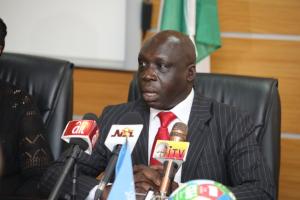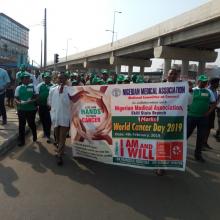Nigeria's call to action - Time to Eliminate Cervical Cancer in Nigeria
Abuja, 06 February 2019 – As Nigeria joins the world to mark the World Cancer Day, the World Health Organization (WHO) has made a call for a renewed fight against cancer. The World Cancer Day is commemorated on the 4th of February every year and it serves as a platform to raise awareness, educate the populace and press for action from governments and individuals. This year’s theme: “I Am and I Will”, urges individuals to make renewed personal commitments against cancer.
WHO’s call to action against Cancer
According to the “Globocon factsheet”, an estimated 116,000 Nigerians had cancer with over 70,000 deaths in 2018. Dr Clement Peter, WHO Officer in Charge during a recent media roundtable on the World Cancer Day stated that “between 30% to 50% of cancer deaths could be prevented by modifying or avoiding key risk factors including avoiding use of tobacco products, reducing alcohol consumption, maintaining a healthy body weight, exercising regularly and addressing infection-related risk factors (Helicobacter Pylori, Human Papilloma Virus, Hepatitis B and C Viruses) amongst others. Tobacco use has been found to be the single greatest avoidable risk factor for cancer deaths. He also stated that “cancer diagnosis should not represent a death sentence, nor should it lead to catastrophic expenditure following out-of-pocket payments for diagnostic, treatment and palliative care.”
Cervical cancer in Nigeria
In line with this call for action, WHO is actively engaged in supporting Nigeria to tackle Cervical Cancer – the second leading cause of cancer mortality in the country. The primary cause of cervical cancer is persistent or chronic infection with one or more of the “high-risk” types of Human Papilloma Virus (HPV). HPV is the most common sexually acquired infection and it is most often acquired in young adults who engage in early sexual debut. The two high-risk HPV types that most commonly cause cervical cancer are types 16 and 18, which together are responsible for approximately 70% of cervical cancer cases.“ In 2008, approximately 14,550 new cases of HPV were reported in Nigeria with eight out of 10 presenting a development of life-threatening cancer and a mortality rate of about 23%.
Cervical cancer can be prevented through vaccination, screening and treatment of pre-cancerous lesions and treatment of invasive cancer with palliative care. At present, HPV Vaccines are only available in private health facilities in Nigeria. Efforts are however being made to include the HPV vaccine as part of national routine immunization. HPV vaccination is recommended for girls between 09-14 years of age and should be administered prior to becoming sexually active.
According to Dr David Atuwo, the National Cancer Control Coordinator at the Federal Ministry of Health (FMOH), “The FMOH is working in collaboration with the Primary Health Agency to make HPV vaccines available as part of the routine vaccines to be given to the target population in Nigeria”. He further mentioned that the “Nigerian Government is also investing heavily on prevention, treatment of pre-cancerous lesions and full cervical cancer across the nooks and cranny of Nigeria. In the next few years, Nigeria will make investment in radiotherapy machines and subsidy on chemotherapeutic agents. There is an urgent need for all partners, private organizations and other stakeholders to support initiatives towards elimination of Cervical cancer in Nigeria”.
WHO support to Cancer of the Cervix Prevention in Nigeria
WHO is supporting the cervical cancer prevention program in Nigeria through strengthening capacity for improved coordination, research and evidence generation as well as through trainings and sensitization.
Dr Muyiwa Ojo, WHO Technical Lead, on Maternal, Sexual and Reproductive Health states that “Cervical cancer is one cancer that we can eliminate in our life time. We know the major causative agent of the cancer which could be prevented in girls and we have the tools for early diagnosis and treatment of pre-cancerous lesion that can be deployed even at Primary Health Care (PHC) level. We also have the political commitment at the highest level“.
WHO is assisting in the coordination roles of Government by supporting development of the National Strategic Plan on Prevention and Control of Cervical Cancer in Nigeria and an implementation plan. Furthermore, WHO is working with government to create a national directory of available services and strengthen monitoring and evaluation for cervical cancer interventions in Nigeria.
Dr Clement concluded his remarks by stating, “A future without cancer is within our individual and collective grasp. As this year’s theme enjoins us, let us all individually and collectively resolve to end the injustice of preventable suffering from cancer as part of our commitment for Universal Health Coverage and the larger push to leave no one behind. Thousands of lives can be saved with proper cancer prevention, early detection, access to proper treatment and care.”




